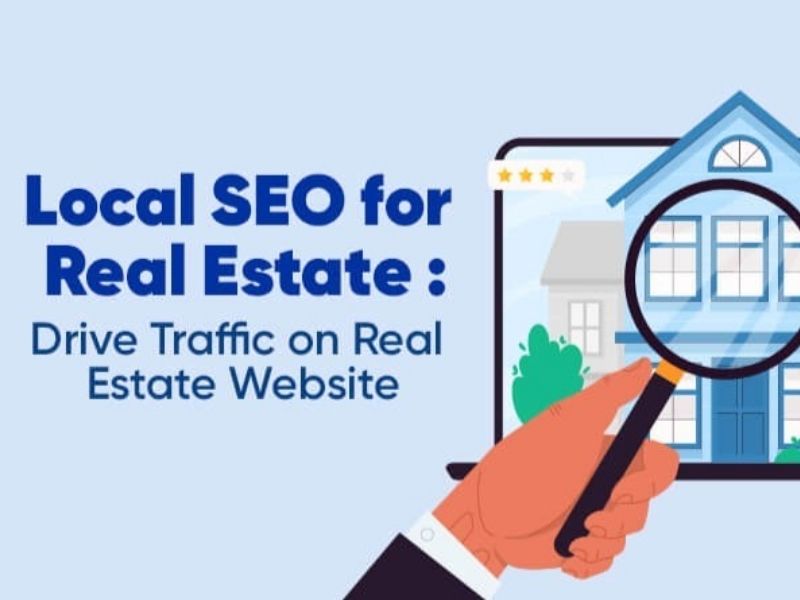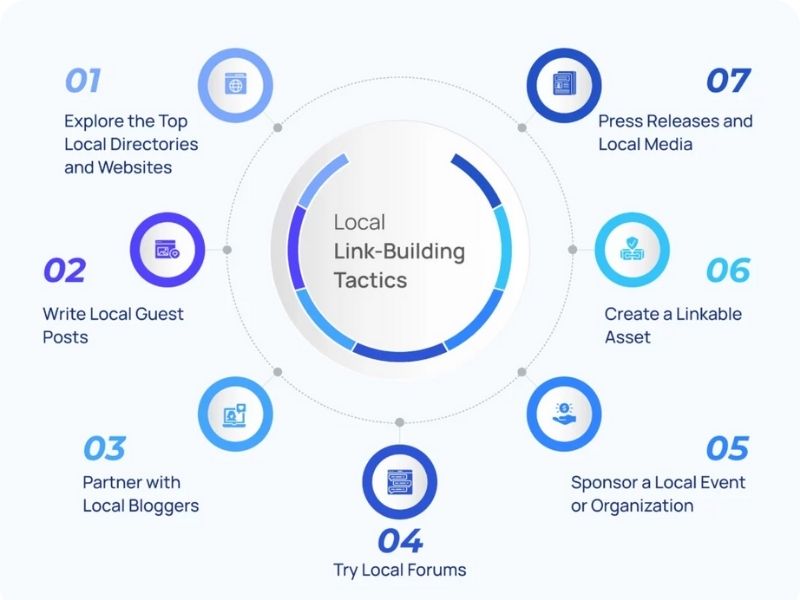When it comes to growing your real estate business, being visible online isn’t optional, it’s essential. That’s where SEO for realtors steps in, giving you the tools to rank higher, attract more clients, and stand out in a crowded market.
At OctopusWriters, we know the secrets to mastering real estate SEO, and we’re sharing them with you. Ready to learn how keywords, local optimization, and expert strategies can help you dominate your niche? Keep reading to discover actionable tips that can transform your online presence and bring your dream clients right to your doorstep.
What is SEO for Realtors meaning?

SEO for Realtors refers to the process of optimizing a real estate website to improve its visibility on search engines like Google, Bing, or Yahoo. It’s not just about getting more traffic, it’s about attracting the right audience: potential homebuyers and sellers actively looking for services or properties in your market.
Whether it’s optimizing property listings, using location-based keywords, or ensuring your site is mobile-friendly, SEO for Realtors is all about making it easier for prospective clients to find you online.
By leveraging effective SEO strategies, you can not only outrank your competitors but also build trust and authority in your local market. It’s a powerful tool to connect with your ideal audience and turn online searches into real-world business opportunities.
How Does SEO for Realtors Work?
SEO for realtors involves fine-tuning various elements of your website to improve its search engine rankings. The position of your site in search results depends on several key factors, including:
- The placement, frequency, and relevance of targeted keywords.
- The number of quality backlinks from reputable websites pointing to your site.
- The speed at which your website loads.
At first glance, SEO might seem as simple as sprinkling a few keywords into your content and asking a couple of local partners to link back to you. However, the reality is far more complex. Why? Because every real estate professional is competing for those coveted top spots.
Just as you’re trying to climb the rankings, your competitors are doing the same. You might secure the number one position today, but a rival realtor’s new SEO strategy could push you down tomorrow. On top of that, new real estate websites are constantly entering the fray, making SEO a continuous effort rather than a one-time task.
Moreover, SEO for realtors is driven by the ever-changing preferences of your audience. Search behavior evolves, one year, people might be looking for “modern luxury apartments,” and a few years later, the trend shifts to “cozy countryside homes.” Staying competitive means not only outranking others but also staying aligned with what your target audience wants and how they search for it.
Feeling overwhelmed? It might seem like a lot of work to compete for that top spot on Google, but think of it this way: you know how crucial the right words are when creating a compelling property listing. SEO operates on the same principle. When done right, it becomes a valuable asset that continuously generates leads and grows your business, just like an expertly written listing.
Why is SEO Crucial for Realtors?

Imagine this: a potential buyer has just landed a new job in a city they’ve never visited before. Naturally, their first step isn’t booking a flight or calling an agent, it’s heading to Google. They type in phrases like “homes for sale in [city name]” or “[city name] real estate agent” to start their search. Here’s where SEO for realtors becomes a game-changer.
Every city has countless agents and property listings vying for attention online. Being on the first page of search results isn’t just important, it’s critical. According to research, a staggering 91.5% of all Google traffic stays on the first page, with nearly 68% of clicks going to the top five organic search results. If your website isn’t optimized, you risk losing out on valuable leads to competitors who are.
Effective SEO for realtors isn’t just about increasing website visitors, it’s about attracting the right visitors. Your goal is to connect with buyers and sellers who are genuinely interested in your services, converting their curiosity into conversations and, ultimately, deals. By strategically using keywords and aligning your content with the needs of your audience, you can position your business to meet their expectations at the perfect moment.
Standing Out in a Crowded Market
When potential clients search for properties, they’re not just browsing for homes, they’re also looking for agents they can trust. Strong SEO for realtors signals professionalism and expertise, making you a top contender in their eyes. By addressing the specific needs of buyers and sellers in your area, you’re not just optimizing your site, you’re building credibility. Clients want someone who understands their unique needs, and your SEO strategy can position you as that expert.
It’s About Strategy, Not Stuffing
It’s tempting to think that all you need to do is sprinkle a few high-traffic keywords across your website to rank higher. Unfortunately, it’s not that simple. Keyword stuffing doesn’t just look unprofessional, it can hurt your rankings. A successful SEO strategy involves understanding the language your audience uses, crafting relevant content, and integrating keywords naturally. The goal is to resonate with your target audience while ensuring search engines recognize your value.
Ultimately, SEO is your gateway to connecting with clients who are actively searching for your services. Done right, it ensures you’re not just another name in the search results, you’re the name that stands out.
How to Optimize Real Estate Listings with SEO for Realtors

Optimizing your real estate listings with SEO for Realtors is one of the smartest ways to improve visibility, attract the right audience, and close more deals. By refining your approach to how you structure and present your listings online, you can stay ahead of the competition while keeping potential clients engaged and ready to take the next step. Here’s a step-by-step guide to get started.
Start with a Responsive and User-Friendly Website
For SEO for Realtors to work effectively, you need a site that is responsive, meaning it adapts seamlessly to mobile devices, tablets, and desktops. Why? Most potential buyers are searching for listings using their smartphones. If your site isn’t mobile-friendly, you’re likely losing out on valuable leads before they even see your listings.
A functional and visually appealing website sets the stage for optimizing your real estate listings. Once your site is polished, fast-loading, and easy to navigate, you can move on to the nitty-gritty of SEO optimization for individual listings.
Conduct Thorough Keyword Research
Keyword research is at the core of SEO for Realtors. Knowing what your audience is searching for helps you craft listings that match their needs and search intent. Tools like Google Keyword Planner can show you the exact phrases people are using when searching for properties in your area. For example, are they typing “downtown condos for sale” or “affordable family homes in Miami”?
With this data, you can strategically place these keywords in your listing titles, descriptions, and even alt text for images. However, avoid the temptation to overuse them. Keyword stuffing doesn’t just hurt your rankings, it can also make your content less appealing to readers.
Optimize Listings for Search Engines
Once you’ve identified the best keywords, it’s time to integrate them into your listings. The goal of SEO for Realtors is to naturally weave these terms into the content while keeping it informative and engaging. Here’s how:
- Write Descriptive Titles: Include relevant keywords in the title of your listing. For instance, instead of writing “Spacious Apartment,” a better option might be “750 Sq Ft One-Bedroom Apartment in Harrisburg.”
- Craft Engaging Descriptions: Describe the property while subtly incorporating keywords. Instead of repeating the same phrases, use variations like “cozy family home” or “modern two-story house.”
- Use Keywords Sparingly: Focus on relevance, not frequency. For example, if research shows “luxury condos in Manhattan” is a popular term, use it strategically in one or two listings instead of every single one.
By aligning your language with how potential buyers search online, your listings will resonate with both clients and search engine algorithms.
Why This Strategy Works
The beauty of SEO for Realtors lies in its ability to align your listings with the intent of potential buyers. Whether they’re looking for a specific type of property, a desirable neighborhood, or a particular price range, optimized listings help connect them with exactly what they’re searching for. By starting with a responsive website, conducting proper keyword research, and thoughtfully optimizing your content, you’ll build an online presence that attracts quality leads and keeps your competitors on their toes.
Top 10 Strategies to Improve SEO for Realtors
Build a High-Performance Real Estate Website
Many real estate websites rely heavily on high-quality images, but this can slow down your site, leading to a poor user experience (UX). Compressing images with tools like Shortpixel reduces file sizes and improves loading times.
If your website still lags, consider these technical SEO fixes:
- Eliminate duplicate content and fix broken links.
- Ensure your site has HTTPS certification for better security and trust.
- Implement proper schema markup, especially RealEstateListing schema, to help search engines understand your content.
A well-optimized site not only attracts search engines but also keeps visitors engaged, increasing the chances of conversion.
Local SEO for real estate: Real estate SEO keywords

Keyword research is at the heart of SEO, helping you identify terms your audience is searching for. As a realtor, targeting long-tail keywords is particularly effective. These specific, low-competition phrases, such as “lakefront homes in [city],” connect you with motivated buyers and sellers.
Aim for phrases with high search volume but low difficulty to maximize your visibility. Once you have your keywords, strategically incorporate them into your property listings, blogs, and pages to align your content with searchers’ intent. This approach positions you as a local authority in the real estate market.
Create Valuable Content
High-quality, informative content can transform your website into a go-to resource for real estate expertise. Start with a blog, even if you’re new to content creation. Write about local real estate trends, buyer tips, or seller strategies, using the keywords you’ve researched.
For effective content:
- Focus on writing naturally for your audience while integrating keywords seamlessly.
- Use optimized titles and structured headings to improve readability and capture featured snippets.
- Add meta descriptions, title tags, and alt text to enhance search engine visibility.
Rich visuals like property tours, layouts, and videos can elevate user experience and engagement. By creating a mix of blogs, social media posts, and videos, you’ll increase brand awareness and establish yourself as a trusted voice in your niche.
Delivering insightful and well-researched content not only helps you rank higher but also builds trust with your audience, giving you a competitive edge in the market.
Optimize Your Website for Mobile Users
With over 60% of website traffic now coming from mobile devices, ensuring your site is mobile-friendly is no longer optional, it’s essential. According to the National Association of Realtors, around 75% of buyers use their phones to search for homes, meaning your mobile site is often the first impression of your business.
Google’s mobile-first indexing prioritizes the mobile version of your website when ranking in search results. If your site isn’t optimized for mobile, you risk losing visibility and potential leads. Tools like Google’s Mobile-Friendly Test can quickly assess how your site performs on smaller screens.
Need improvements? Focus on creating a responsive design through your content management system (CMS) and ensure all key features, such as search functions and images, load seamlessly. A mobile-optimized site not only improves user experience but also boosts your SEO efforts, making it easier for clients to find and trust your services.
Leverage Social Media to Build Backlinks and Brand Awareness
Social media platforms are invaluable for realtors, with studies showing that 90% of real estate agents use Facebook, and roughly half are active on Instagram and LinkedIn. While social media backlinks don’t directly influence rankings, they significantly enhance your brand’s visibility and credibility.
Identify where your audience and competitors are most active, whether it’s Instagram for younger buyers or LinkedIn for luxury properties, and focus your efforts there. Engage in meaningful conversations about local real estate trends and share helpful tips to establish yourself as a knowledgeable resource.
While it’s important to distribute your content on social media, avoid over-promotion. Instead, share a mix of insights, advice, and visually appealing posts, like property tours or neighborhood highlights, to keep your audience engaged. A strong social media presence not only drives traffic but positions you as the go-to expert in your area.
Track Key Performance Indicators (KPIs)
Monitoring your SEO efforts is vital to understanding what works and what needs improvement. By tracking relevant KPIs, you can evaluate your progress and make data-driven decisions. Here are some essential metrics for real estate SEO:
- Organic Traffic: The number of visitors arriving via search engines.
- Keyword Rankings: The position of your targeted keywords in search results.
- SERP Visibility: How often your brand appears in organic searches.
- Bounce Rate: The percentage of visitors leaving without interacting.
- Backlinks: Links from other websites pointing to your site.
- Conversion Rate: Actions taken, such as form submissions, calls, or property inquiries.
Set clear goals, such as increasing website traffic by 50% over the next year or boosting your ranking for key local terms. Regularly analyze these metrics to refine your strategy and align your efforts with your business objectives. Tracking KPIs ensures you stay informed about your performance and keep ahead of the competition.
Set Up Complete Profiles and Listings in Directories
Having a professional and comprehensive presence on platforms like Google Business Profile (GBP) is crucial. Research shows that customers are 2.7 times more likely to trust a business with a complete profile, including reviews and photos.
Ensure your GBP is fully optimized with accurate contact information, a compelling business description, and high-quality visuals. Encourage clients to leave reviews and make it a habit to respond to each one, showcasing your commitment to excellent service.
Expand your visibility by listing your business on other industry directories and platforms relevant to your market. Use local keywords, such as “homes for sale in [City]” or “[Town] real estate agent,” to align your profiles with what potential clients are searching for.
Wherever your business is mentioned online, be consistent with your information and highlight your service areas. This not only builds trust with potential clients but also strengthens your local SEO presence.
Use Video Content to Showcase Properties
Video content is a game-changer for realtors aiming to engage their audience and boost SEO. Platforms like YouTube are highly searchable, making them an excellent way to drive organic traffic to your website. Create virtual tours of your properties, showcase neighborhood highlights, or share educational videos about the buying and selling process.
Incorporate relevant keywords in your video titles, descriptions, and tags to optimize them for search engines. For example, a video titled “Virtual Tour: Modern 3-Bedroom Home in Austin” is not only engaging but also SEO-friendly. Embed these videos on your website and share them on social media to increase visibility and attract high-intent viewers.
Utilize Local Link Building

Building local backlinks is a powerful way to establish authority and improve search rankings. Partner with local businesses, schools, or community organizations to earn links to your site. For instance, collaborate with a popular neighborhood café to feature a blog post about “The Best Communities to Live in [City].”
You can also get listed in local directories, sponsor community events, or contribute guest posts to local blogs. These efforts not only improve your SEO but also position you as an integral part of the local community, building trust with potential clients.
Implement Advanced Schema Markup
Schema markup is a behind-the-scenes tool that helps search engines understand your website content. For realtors, using specialized schema like RealEstateListing or LocalBusiness can significantly enhance your SEO. This markup provides search engines with detailed information about your listings, such as property type, price, location, and amenities.
By implementing schema markup, you increase the chances of appearing in rich search results, such as property cards or map packs, making your listings more visually appealing and clickable. Use Google’s Structured Data Testing Tool to verify your markup and ensure it’s correctly implemented.
Create Interactive Tools for Your Audience
One way to stand out and improve SEO for realtors is by offering interactive tools on your website. Features like mortgage calculators, home affordability estimators, or property comparison tools not only provide value to your visitors but also increase user engagement. When people spend more time on your site using these tools, search engines interpret it as a signal of quality content, which can boost your rankings.
For example, a “What’s My Home Worth?” tool can attract homeowners interested in selling, while a mortgage calculator appeals to buyers evaluating their budgets. These tools can be further optimized by incorporating keywords like “best home value calculator for [city]” or “property comparison tool for [city] real estate.” This helps position your site as a helpful resource in the competitive landscape of SEO for realtors, keeping visitors engaged and returning for more.
Optimize Your Site for Voice Search
With the rise of virtual assistants like Siri and Alexa, voice search is becoming a significant player in real estate queries. People are now asking questions like, “Where can I find affordable homes near me?” or “Who’s the best realtor in [city]?” Adapting your SEO for realtors strategy to include voice search optimization can give you an edge.
Focus on natural, conversational keywords that mimic how people speak, such as long-tail phrases in the form of questions. For instance, create FAQ pages answering common queries like “What’s the best neighborhood to buy a home in [city]?” Voice search also heavily favors local results, so ensure your Google Business Profile is up-to-date and that your website prominently features your location and services.
By leveraging interactive tools and optimizing for voice search, you can tap into emerging trends while strengthening your SEO for realtors, giving you a competitive advantage in attracting more qualified leads.
What Is Seo For Realtors Examples That You Need To Know
SEO for realtors involves a series of strategies aimed at improving a real estate website’s visibility in search engine results. To grasp how it works in real-world scenarios, let’s explore some practical examples that demonstrate its impact.
Imagine you’re a realtor in Miami specializing in waterfront properties. By targeting specific long-tail keywords like “luxury waterfront homes in Miami” or “oceanfront condos for sale Miami,” you can attract high-intent clients searching for properties in your niche. Optimizing your site with these terms in property titles, descriptions, and blog posts helps search engines understand your focus, making it more likely to rank your website for these queries.
Another example is local SEO. Let’s say you have a Google Business Profile that’s fully optimized with photos, reviews, and accurate contact details. When someone searches for “real estate agents near me,” your profile has a higher chance of appearing in the local pack, directly connecting you with potential clients in your area.
Content creation is also a vital element of SEO for realtors. For instance, a blog post titled “Top 5 Neighborhoods to Buy a Family Home in Austin” not only provides value to readers but also incorporates location-based keywords, boosting your visibility for searches related to Austin real estate.
Lastly, schema markup offers another practical application. By implementing RealEstateListing schema, you help search engines display details like property prices, locations, and features directly in search results. For example, when someone searches for “affordable 2-bedroom homes in Chicago,” your listings might appear with rich details, making them more clickable and engaging.
These examples show how SEO for realtors works in action, from targeting keywords to leveraging local SEO, content, and technical enhancements, to connect with your target audience and drive meaningful results.
SEO for Real Estate Investors

When it comes to real estate investors, SEO for realtors plays a pivotal role in reaching motivated sellers, buyers, and other industry professionals. Investors often target niche markets, such as foreclosures, rental properties, or multi-family homes, making search engine optimization a critical tool for connecting with the right audience.
By focusing on long-tail keywords like “investment properties in [city]” or “rental homes with high ROI,” you can attract visitors who are specifically searching for profitable opportunities. Creating blog content about market trends, financing strategies, or tips for evaluating properties further establishes your expertise while improving your visibility in search results.
Additionally, leveraging local SEO tactics, such as optimizing a Google Business Profile and earning backlinks from local directories, enhances your credibility and makes your website more discoverable. Whether you’re flipping homes or building a rental portfolio, a strong SEO strategy ensures your services stand out in the competitive real estate landscape. For investors, just like SEO for realtors, the right optimization techniques can mean the difference between being found by motivated clients or being overlooked entirely.
SEO for Estate Agents
For individual estate agents, building a strong online presence is essential to compete in a saturated market. SEO for realtors helps agents connect with potential clients by making their services easily discoverable on search engines. By targeting localized keywords like “top estate agents in [city]” or “best property agents near me,” you can attract buyers and sellers who are actively seeking your expertise.
An effective strategy involves optimizing your Google Business Profile with updated contact information, professional photos, and positive reviews. Combine this with high-quality content such as blog posts that answer common client questions, like “How to Prepare Your Home for Sale,” and you establish yourself as a knowledgeable and trustworthy agent. Incorporating internal links within your website also ensures visitors can navigate seamlessly, improving their experience and boosting your ranking.
SEO for realtors is not just about driving traffic, it’s about targeting the right audience. By focusing on the needs of your clients and tailoring your online content to address their concerns, you can enhance your visibility and grow your client base effectively.
SEO for Estate Agencies
For estate agencies managing multiple properties and clients, implementing SEO for realtors at scale is critical for success. Agencies must focus on creating a user-friendly website that showcases listings in an organized and visually appealing manner. Each property page should include optimized titles, detailed descriptions, and high-quality images, all enriched with keywords like “luxury homes in [city]” or “commercial properties for rent in [area].”
At OctopusWriters, we understand that beyond individual listings, content marketing plays a key role in building authority for estate agencies. Publishing market reports, guides for first-time buyers, or tips for property investors helps position your agency as a trusted resource in the real estate industry. Consistently publishing such high-value content not only engages your audience but also improves your site’s SEO performance. Pair this with a robust backlink strategy by collaborating with local businesses or getting featured in industry directories to strengthen your domain authority.
Incorporating schema markup for listings and reviews ensures search engines display your information accurately and prominently. Additionally, leveraging local SEO by listing your agency in directories and optimizing for terms like “[city] estate agency” improves your chances of dominating search results. With expert guidance from OctopusWriters, estate agencies can effectively implement SEO for realtors, enhancing visibility, attracting more clients, and solidifying their reputation in the market.
Understanding the ROI of Real Estate SEO

When it comes to digital marketing, few strategies offer the long-term benefits of SEO. According to a study by Outbrain, organic search generates 300% more traffic than social media, making it a powerhouse for driving potential clients to your site. In a separate Twitter poll conducted by Search Engine Journal, nearly half (49%) of marketers stated that organic search delivers the highest return on investment (ROI) compared to other digital channels.
These numbers clearly show that SEO for realtors can significantly increase website traffic and, eventually, profits. However, it’s important to understand that SEO isn’t a quick fix, it’s a long-term strategy. Unlike paid ads, which can provide immediate results, SEO requires patience and consistent effort. It might take months to see substantial returns, but the payoff is worth the wait. With time and persistence, your optimized content can reach a portion of the millions of users searching online daily, bringing sustainable and meaningful growth to your real estate business.
Avoiding Common SEO Mistakes for Realtors
Mastering SEO for realtors requires careful planning and execution. However, common mistakes can hinder progress if not addressed. Here are key pitfalls to avoid and how to tackle them effectively.
Keyword Stuffing and Over-Optimization
Overusing keywords in an attempt to boost rankings is a frequent mistake. While keywords are crucial, stuffing them into your content can harm your rankings and user experience.
Search engines penalize keyword stuffing, pushing your site lower in rankings. Additionally, keyword-heavy content is harder to read and less engaging, driving users away.
Focus on writing high-quality, natural content that provides real value to your audience. Keywords should blend seamlessly into your text, enhancing readability while aligning with SEO goals.
Ignoring Mobile Optimization
In today’s mobile-driven world, a site that isn’t mobile-friendly is a missed opportunity for effective SEO for realtors.
With mobile-first indexing, search engines prioritize mobile versions of websites. A non-optimized site risks lower rankings and lost leads due to poor mobile experiences.
Invest in responsive website design to ensure your site adapts to all screen sizes. Use Google’s Mobile-Friendly Test to identify issues and make necessary improvements.
Neglecting Website Speed
Slow-loading websites can drive users away before they engage, severely impacting your SEO performance.
High bounce rates from slow pages negatively affect rankings. Plus, a slow site creates a poor first impression, reducing client trust and engagement.
Optimize site speed by compressing images, using caching, and employing a Content Delivery Network (CDN). Regularly test speed with tools like Google PageSpeed Insights to stay on top of performance.
Not Adapting to Algorithm Updates
Search engines constantly update their algorithms, and failing to adapt can render your SEO strategies obsolete.
Outdated methods can lead to lower rankings or even penalties. Staying stagnant risks losing relevance in an ever-evolving digital landscape.
Follow authoritative SEO blogs and industry news to stay informed about updates. Engage with SEO communities and consider periodic training to ensure your strategies remain effective.
Conclusion
SEO for realtors is a powerful tool that helps you stand out, connect with your target audience, and turn potential leads into loyal clients. By implementing strategies like optimizing your website, targeting local keywords, creating valuable content, and avoiding common SEO mistakes, you can ensure your real estate business thrives in the digital landscape.
At OctopusWriters, we understand the unique challenges realtors face when building an effective SEO strategy. Whether you’re an individual agent or part of a larger agency, our team is here to guide you with tailored solutions to improve your rankings, attract high-quality traffic, and grow your brand.
SEO For Realtors – Frequently Asked Questions
What is the first step in SEO for realtors?
The first step is conducting keyword research to understand what potential clients are searching for online. This helps you create content and optimize your site effectively.
How long does it take to see SEO results in real estate?
SEO is a long-term investment. While some improvements might be visible in the first few months, significant results typically take 3-6 months or more.
Is blogging necessary for realtors?
Absolutely. Blogging helps establish your authority in the real estate market, improves SEO, and keeps your website updated with fresh and engaging content.
Can social media improve my SEO?
Yes, but indirectly. While social media itself doesn’t directly influence search rankings, it drives traffic to your site and boosts your brand’s online presence, which can support your SEO efforts.
Do I need professional help for SEO?
While you can manage some basic SEO tasks yourself, hiring a professional, like the team at OctopusWriters, ensures a more efficient and impactful strategy, especially for complex real estate markets.

